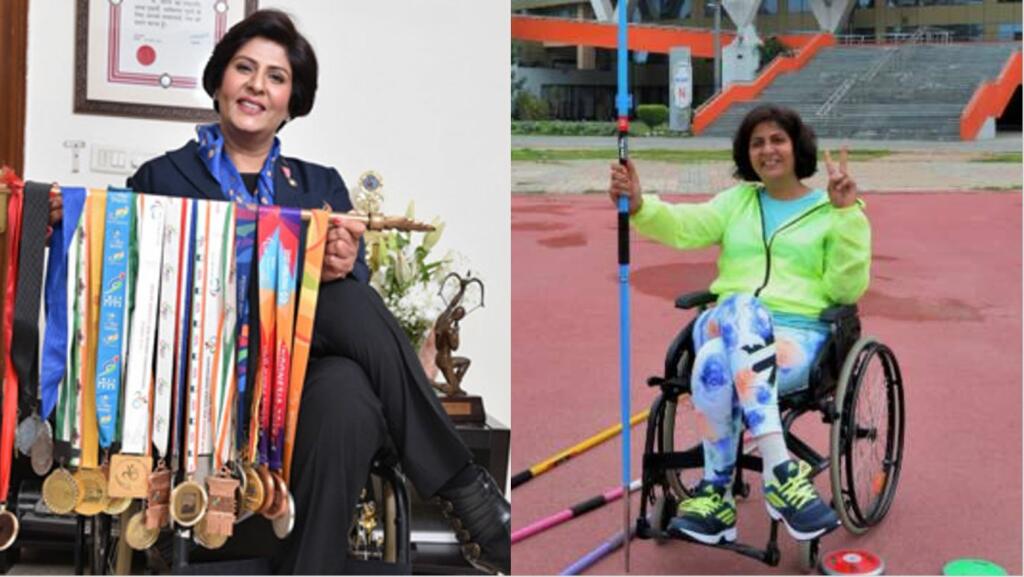It’s raining medals at the Tokyo Paralympics 2020. After the Indian athletes brought the biggest haul of Olympics medals, it is the Paralympians that are making the nation proud through their superhuman efforts. India has already won two gold, four silver and two bronze medals, bettering the haul of Rio Olympics 2016. At the Rio Games, the Indian contingent returned with a haul of four medals, including two gold, a silver, and a bronze. One of the biggest forces behind the change and the swarm of medals is Deepa Malik, the President of the Indian Paralympics Committee and a former Olympian herself.
Deepa’s journey to the sporting pinnacle and now the top administrative echelons of the country hasn’t been short of challenges. Deepa was diagnosed with a spine tumour when she was just 5. It took around 3 years of treatment and aggressive physiotherapy to recover from that. In 1999, when she was 29, the spine tumour returned, and doctors were left with no other option but to operate. They made it clear to her that the surgery would make her unable to walk. It took 3 surgeries and 183 stitches to eliminate the cancerous tumour off her body.
However, at the age of 36, an age where most athletes are in the twilight of their career and thinking of hanging their boots, Deepa Malik took the valiant decision of venturing into the sporting arena. And since then, she has become one of the most decorated Paralympians India has ever produced. At 45, she became the oldest and first Indian woman to win an Olympic medal in Rio 2016.
She won a silver in the Shot-put event, despite the particular sporting discipline not being her first choice. She had hoped to represent India in Rio in Javelin throw until it was announced that javelin had been replaced by shot put in her category.
Deepa Malik has been a flag bearer for para-sports in the country and she was awarded Rajiv Gandhi Khel Ratna on August 29 last year and as a result, she became the first Indian woman para-athlete to be conferred with the accolade. To date, she has won 58 national and 23 international medals. Malik is also a recipient of the Padma Shri and Arjuna Award.
And now leading the Federation that looks after the athletes that need the most attention, Deepa Malik has led by example. Talking about donning the new hat after being a Paralympic athlete, a motor rally driver, a swimmer, a sports bike racer, an entrepreneur, a motivational speaker, and a prominent disability activist, Deepa remarked:
“My career has been full of challenges. Be it to be the first biker, first swimmer, first rally-ist, first Asian medallist in athletics, first world championship, and now I am the first athlete-president of the federation. That too at such a challenging time with no other precedent to follow. I had to dig my own well and drink my own water. It was a lot of learning. We all were learning the new normal.”
Thank you for these opportunities which help me achieve my purpose of promoting #abilitybeyonddisability and brands like @MGMotorIn #MGAstor with inclusion at their heart will help us promote the #WeThe15 spirit. It's an honour to be associated. @rajeev_chaba https://t.co/7258aqK2uJ
— Deepa Malik PLY (@DeepaAthlete) August 31, 2021
Yesterday, India won an unprecedented 5 medals – 2 gold, 2 silver and a bronze – in a single day in Tokyo. The winners also included the country’s first-ever Paralympic gold medal-winning woman athlete in shooter Avani Lekhara.
What makes the achievement sweeter is the fact that despite the Olympics being delayed by a year due to China made coronavirus pandemic, India managed to send its biggest contingent with 54 athletes. Deepa Malik attributes the success of the Paralympians to the athlete-centric approach taken by the Federation and the government.
She said, “Once this position was being offered it was a good opportunity to fill in the gap and if the federation itself wants an athlete in the lead role and a person who comes from the severe most disability categories, then that itself sensitises them and the system to the needs of the athletes. My governing body members have been very supportive from day one and because of the great teamwork, my job has become a lot easier,” she further explained.
(1/2) My heartiest congratulations on the commencement of new innings of a fresh tenure in @ParalympicIndia. Expressing my gratitude on being trusted with the Presidentship and welcoming an athlete centric approach in para sports in India. https://t.co/oqIj2EM7Lk
— Deepa Malik PLY (@DeepaAthlete) February 1, 2020
India’s tally could have been higher, but they lost a bronze after athlete Vinod Kumar, who had finished third in the discus (F52) on Sunday, was found ineligible in the disability classification assessment.
The other sporting federations need to take a cue out of Paralympics Committee and understand that having an athlete that has plied their trade in the middle can bring in the desired changes. Deepa Malik set the example in the field and now in the administration department, she is scripting a similar story.
